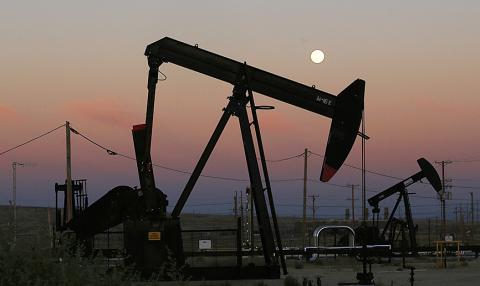Rising global oil supply, driven by crude giants Saudi Arabia and Russia, might come under pressure as key producers face disruptions, the International Energy Agency’s (IEA) Oil Monthly Report said.
In the report released yesterday the IEA welcomed last month’s agreement between OPEC and Russia to open the taps to bring prices down from multiyear highs.
However, it pointed to supply disruptions in Libya after a string of attacks on infrastructure.

Photo: AP
It also highlighted continuing unrest in Venezuela and a drop in Iranian exports after US President Donald Trump announced he was pulling the nation out of the landmark nuclear deal reached in 2015.
“The large number of disruptions reminds us of the pressure on global oil supply,” the IEA said. “This will become an even bigger issue as rising production from Middle East Gulf countries and Russia, welcome though it is, comes at the expense of the world’s spare capacity cushion, which might be stretched to the limit.”
The IEA report was published a day after both main oil contracts were sent into freefall by worries over a stronger US dollar and the impact of the global trade war on demand.
The selling was also fanned by Libya’s resumption on Wednesday of oil exports from its eastern production heartland after a showdown between the war-torn nation’s rival authorities.
Even though Libyan exports have resumed, the IEA remains worried for the future.
“At the time of writing, the situation seemed to be improving, but we cannot know if stability will return,” it said. “The fact that so much production is vulnerable is clearly a cause for concern.”
Also worrisome was the unabating unrest in Venezuela, which has sent output from the Latin American oil giant crashing in recent weeks.
Moreover, while Iran has yet to feel the full impact of renewed US sanctions, the IEA fears there could be “an even steeper reduction than the 1.2 million barrels per day seen during the previous round of sanctions.”
Iraq, which is also chronically restive, does not have spare capacity either, leaving most of the job of hiking OPEC production to Saudi Arabia, the United Arab Emirates and Kuwait.
“We see no sign of higher production from elsewhere that might ease fears of market tightness,” the IEA said.
Saudi Arabia and Russia opened their taps ahead of a key Vienna meeting last month where OPEC and Moscow agreed to up output to bring prices down.
“Already in June the two key producers lifted output by more than 500,000 barrels per day between them,” the IEA said. “Saudi Arabia’s sharp increase allowed it to overtake the US and reclaim its position as the world’s second-largest crude producer, and if it carries out its intention to produce at a record rate near 11 million barrels per day this month, it will challenge Russia,” it added.
However, they alone cannot carry the burden of keeping the oil market stable.
“Despite higher output in June, OPEC oil supply was down 700,000 barrels per day compared to a year ago, with Venezuela lower by nearly 800,000 barrels per day, Angola by 210,000 barrels per day and Libya by 130,000 barrels per day,” the IEA said.
“Even so, global oil output was 1.25 million barrels per day higher than a year ago as rampant US output underpinned healthy non-OPEC growth,” it said.

Intel Corp chief executive officer Lip-Bu Tan (陳立武) is expected to meet with Taiwanese suppliers next month in conjunction with the opening of the Computex Taipei trade show, supply chain sources said on Monday. The visit, the first for Tan to Taiwan since assuming his new post last month, would be aimed at enhancing Intel’s ties with suppliers in Taiwan as he attempts to help turn around the struggling US chipmaker, the sources said. Tan is to hold a banquet to celebrate Intel’s 40-year presence in Taiwan before Computex opens on May 20 and invite dozens of Taiwanese suppliers to exchange views

Application-specific integrated circuit designer Faraday Technology Corp (智原) yesterday said that although revenue this quarter would decline 30 percent from last quarter, it retained its full-year forecast of revenue growth of 100 percent. The company attributed the quarterly drop to a slowdown in customers’ production of chips using Faraday’s advanced packaging technology. The company is still confident about its revenue growth this year, given its strong “design-win” — or the projects it won to help customers design their chips, Faraday president Steve Wang (王國雍) told an online earnings conference. “The design-win this year is better than we expected. We believe we will win

Chizuko Kimura has become the first female sushi chef in the world to win a Michelin star, fulfilling a promise she made to her dying husband to continue his legacy. The 54-year-old Japanese chef regained the Michelin star her late husband, Shunei Kimura, won three years ago for their Sushi Shunei restaurant in Paris. For Shunei Kimura, the star was a dream come true. However, the joy was short-lived. He died from cancer just three months later in June 2022. He was 65. The following year, the restaurant in the heart of Montmartre lost its star rating. Chizuko Kimura insisted that the new star is still down

While China’s leaders use their economic and political might to fight US President Donald Trump’s trade war “to the end,” its army of social media soldiers are embarking on a more humorous campaign online. Trump’s tariff blitz has seen Washington and Beijing impose eye-watering duties on imports from the other, fanning a standoff between the economic superpowers that has sparked global recession fears and sent markets into a tailspin. Trump says his policy is a response to years of being “ripped off” by other countries and aims to bring manufacturing to the US, forcing companies to employ US workers. However, China’s online warriors